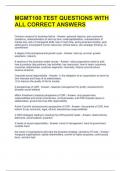MGMT100 TEST QUESTIONS WITH
ALL CORRECT ANSWERS
Common reasons for business failure - Answer- personal reasons, poor economic
conditions, underestimation of start-up time, undercapitalisation, overestimation of
market size, lack of managerial skills, lack of cash flow, wrong business location, poor
selling point, incompetent human resources, ethical failure, zero strategic thinking, no
commitment
5 stages of the entrepreneurial growth cycle - Answer- start-up, survival, growth,
expansion, maturity
9 sections of the business model canvas - Answer- value propositions (what to sell),
how to produce (key partners, key activities, key resources), how to reach customers
(customer relationships, customer segments, channels), finance (cost structure,
revenue streams)
Corporate social responsibility - Answer- 1) the obligation of an organization to serve its
own interests and those of its stakeholders,
2) to improve the quality of life for society
2 perspectives of CSR - Answer- classical (management for profit), socioeconomic
(broader social welfare)
Milton Friedman's classical perspective of CSR - Answer- only people have
responsibilites and social consciences, not businesses, and CSR imposes taxes on
stakeholders, government has little responsibility
Archie Carroll's socioeconomic perspective of CSR - Answer- the pyramid of CSR, from
bottom to top: economic, legal, ethical, discretionary responsibilities
4 CSR strategies relating to meeting the CSR pyramid needs - Answer- obstructionist,
defensive, accomodative, proactive
3 hands of social responsibility - Answer- hand of management, hand of government,
invisible hand
the name of organisations who take the proactive strategy, named by O'Toole - Answer-
Vanguard organisations: satisfy stakeholders, commit to higher purposes, continuously
learn, and aim high
,arguments against CSR - Answer- classical economics, business not equipped, dilutes
business purpose, too much power already, decreases public accountability, higher
costs
arguments for CSR - Answer- better public image, avoids more government regulation,
balances power, greater long-term profit
3 arguments of the hand of management - Answer- anti-freeloader, capacity,
enlightened self-interest
iron law of responsibility - Answer- in the long run, those who do not use power in ways
that society considers responsible will tend to lose it
5 methods for monitoring social demands and expectations - Answer- social forecasting,
opinion surveys, social audits, issues management, social scanning
3 types of management ethics - Answer- moral, amoral, immoral management
Andrew Carnegie's 2 principles - Answer- charity principle, stewardship principle
3 domains of human action - Answer- codified law, ethics, free choice
5 frameworks for ethical decision making - Answer- utilitarian, individualism, moral-
rights, justice, practical
utilitarian approach - Answer- provide the greatest good for the greatest number of
people
individualism approach - Answer- contends that acts are moral when they promote the
individual's best long-term interests, greater good is achieved when everyone pursues
self direction and learns to accommodate everyone else for that reason, includes golden
rule
moral-rights approach - Answer- humans have fundamental rights and liberties that
cannot be taken away by an individual's decision; that ethical decisions are those that
best maintain the fundamental rights of the people affected by them
justice approach - Answer- moral decisions must be based on standards of equity,
fairness, and impartiality
practical approach - Answer- sidesteps debates about what is right, good, or just and
bases decisions on prevailing standards of the profession and the larger society, taking
the interests of all stakeholders into account
3 pillars of sustainability - Answer- environment, economy, society
, 6 outputs of a traditional linear economy - Answer- growth, knowledge, technology,
waste, pollution, resource depletion
World Business Council definition for sustainability - Answer- meeting the needs of
people today without compromising the ability of future generations to meet their own
needs
United Nations 17 sustainable goals - Answer- 1) ending poverty
2) make cities safe and sustainable
3) sustainable consumption and production
Hei Puawaitanga - Answer- sustainability, citizenship, and civic imagination
Kyoto Protocol (1997) - Answer- the main international treaty on global warming, which
entered into effect in 2005, mandates cuts in carbon emissions via emissions trading,
clean development mechanism, joint implementation projects, almost all the world's
major countries except the United States are participants
TIF approach - Answer- topic (content dealing with),
instructions (command terms),
focus (what specifically to talk about and how to do so)
4 Maori systems of resources - Answer- nga awa (freshwater), rangi (sky), moana
(ocean), whenua (earth)
the first 2 people to discover Aotearoa (900AD) - Answer- Kupe and Kuramarotini
3 tikanga Kupe and Kuramarotini brought to Aotearoa - Answer- whanaungatanga,
manaakitanga, kaitiakitanga
whanaungatanga - Answer- principle of valuing family and relations
manaakitanga - Answer- principle of valuing respect and hierarchy
kaitiakitanga - Answer- principle of valuing guardianship and conservation
timeline of establishment of New Zealand - Answer- Tasman (1642), Cook (1769),
Westminster legal system and commerce (1770s), church missionaries (1810s), semi
permanent trader-settlers (1830s), he whakaputanga (1835), purchase of Wellington
(1839), treaty of Waitangi (1840), Waitangi Tribunal (1975), claim for reownership of
Wellington land (1987), settlement over Wellington land (2009)
how 90 percent of Wellington was purchased - Answer- by colonel William Wakefield in
the New Zealand Company, from 16 Maori chiefs in 1839, in exchange for European
goods such as pots, hooks, guns, clothing




